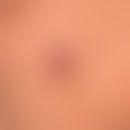Synonym(s)
HistoryThis section has been translated automatically.
DefinitionThis section has been translated automatically.
Perifollicular granuloma formation in chronic dermatophytosis, which usually develops after trauma (e.g. shaving, e.g. shaving of the lower legs)
You might also be interested in
PathogenThis section has been translated automatically.
Trichophyton rubrum (by far the most common pathogen) and also Trichophyton violaceum are frequently found in the classical form.
EtiopathogenesisThis section has been translated automatically.
In the classic (cutaneous or dermal) form of nodular granulomatous perifolliculitis, fungal elements (with a possible pre-existing tinea faciei) penetrate the dermis via a ruptured follicle following trivial injuries (e.g. shaving). Dislocated keratin serves as a substrate for the pathogen. This develops into a therapy-resistant (can only be treated systemically!), chronic, perifollicular granuloma.
In the deep dermal-subcutaneous (nodular) form of nodular granulomatous perifolliculitis (granuloma trichophyticum), which mainly occurs in immunocompromised patients, a chronic, deep suppurative folliculitis and perifolliculitis (boils), which is often still bacterially superimposed, also occurs after a banal follicular injury with pre-existing tinea (Gupta S et al. 2000). Local factors such as long-term use of external glucocorticoids favor the penetration of pathogens. Such pre-treatments can lead to a concealment of the classic signs of infection and thus to the appearance of tinea incognito.
LocalizationThis section has been translated automatically.
Especially beard area, extremity extensor sides (shaving of the legs!), inguinal, scrotal and glutaeal area. Accordingly, the clinical picture is also characterized by topographical peculiarities.
ClinicThis section has been translated automatically.
Painless or only slightly pressure-painful reddish-brown papules, nodules or extensive inflammatory, scaly plaques with a reddened surface.
DiagnosisThis section has been translated automatically.
Differential diagnosisThis section has been translated automatically.
Erythema nodosum (higher acuteity and painfulness)
Erythema induratum Bazin (nodular vasculitis): Inflammatory, in interval phases only moderately, in recurrent phases clearly painful, red to brown-red, solid, cutaneous or subcutaneous nodules and plaques. Size: 2.5 cm, rarely up to 10 cm. Frequently, but not always, with mostly deep-reaching central necrotic melting and subsequent roundish, poorly healing ulceration. Extremely chronic or chronically recurrent course over several years possible.
TherapyThis section has been translated automatically.
Internally (a systemic therapy is always to be aimed at) and externally antimycotic (e.g. Terbinafine p.o. - Rallis E et al. 2016), see below. Mycoses, dermatomycoses.
ProphylaxisThis section has been translated automatically.
Since an increasing incidence of nodular granulomatous perifolliculitis in immunocompromised persons is detectable, consistent antifungal prevention and therapy should be carried out.
LiteratureThis section has been translated automatically.
- Coelho WS et al (2009) Case for diagnosis. Granuloma trichophyticum (Majocchi's granuloma. On Bras Dermatol 84:85-86
- Gupta S et al (2000) Majocchi's granuloma trichophyticum in an immunocompromised patient. Int J Dermatol 39:140-141
- Meinhof W (1977) Granuloma trichophyticum. dermatologist 28:214-215
- Nishiyama C et al (1985) Studies on the parasitic forms of Trichophyton rubrum isolated from patients with granuloma trichophyticum using the "agar-implantation method". J Dermatol 12:325-328
- Rallis E et al (2016) Pubic Majocchi's Granuloma Unresponsive to Itraconazole Successfully Treated withOral
Terbinafine. Skin Appendage Disord 1(3):111-113.
Outgoing links (10)
Biopsy; Dermatomycoses; Erythema nodosum; Folliculitis (overview); Mycoses; Nodular vasculitis; Terbinafine; Tinea faciei; Trichophyton rubrum; Trichophyton violaceum;Disclaimer
Please ask your physician for a reliable diagnosis. This website is only meant as a reference.




